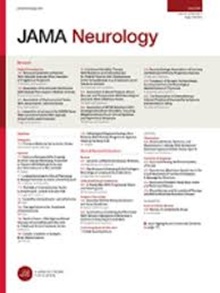Therapeutic Management During Pregnancy and Relapse Risk in Women With Multiple Sclerosis.
IF 21.3
1区 医学
Q1 CLINICAL NEUROLOGY
引用次数: 0
Abstract
Importance In women with multiple sclerosis (MS), disease-modifying therapy (DMT) management during pregnancy might impact relapse risk. Objective To estimate the effect of DMT management during pregnancy on MS relapse rate and compare different therapeutic strategies. Design, Setting, and Participants This was a multicenter retrospective cohort study using data from January 1990 to December 2023. Data were extracted in December 2023 from the French MS registry. Among 52 955 women in the registry, we included pregnancies identified through childbirths in patients with relapsing-onset MS who were monitored for at least 18 months before delivery and 9 months after. Pregnancies occurring less than 18 months apart or with missing month of birth were excluded. Exposures Mediation analysis was used to estimate the total, direct, and indirect (mediated by DMT management) effects of pregnancy. Different therapeutic strategies were compared: DMT interruption, switching to or maintaining interferon β or glatiramer acetate, switching to or maintaining natalizumab until the third trimester, and switching to or maintaining intravenous anti-CD20 and interrupting it 3 months before conception. Main Outcomes and Measures The primary outcome was the annualized relapse rate (ARR) during the preconception, gestation, and postpartum periods. Within a causal inference framework, counterfactual ARRs were estimated using longitudinal g-computation, combining a random forest algorithm for predicting DMTs, and a mixed-effects Poisson model for relapses. Results We included 6341 pregnancies occurring in 4998 women (mean [SD] age at conception, 31.5 [4.5] years). DMT management during pregnancy significantly increased ARR during gestation (causal rate ratio [cRR], 1.13; 95% CI, 1.06-1.22) and postpartum (cRR, 1.08; 95% CI, 1.01-1.16) periods. This led to a deleterious total effect of pregnancy on ARR, particularly in women receiving natalizumab before pregnancy with prolonged interruption (ie, interruption before the second trimester or resumption more than 3 months after delivery; cRR, 2.18; 95% CI, 1.76-2.69), and in women receiving fingolimod (cRR, 2.15; 95% CI, 1.60-2.93). Compared to DMT interruption, anti-CD20 strategy was the most effective (cRR, 0.38; 95% CI, 0.25-0.52), followed by the natalizumab strategy with short interruption (cRR, 0.80; 95% CI, 0.71-0.90), whereas interferon β (cRR, 0.93; 95% CI, 0.86-0.99) and glatiramer acetate strategies (cRR, 0.91; 95% CI, 0.84-0.99) were less effective. Conclusion In this study, DMT management during pregnancy significantly increased relapse risk, particularly in patients receiving natalizumab with prolonged interruption or fingolimod. The strategy based on the use of anti-CD20 before pregnancy was the most effective to mitigate this risk.多发性硬化症妇女妊娠期治疗管理和复发风险。
在患有多发性硬化症(MS)的女性中,妊娠期间的疾病改善治疗(DMT)管理可能会影响复发风险。目的探讨妊娠期DMT治疗对多发性硬化症复发率的影响,并比较不同治疗策略。设计、环境和参与者:这是一项多中心回顾性队列研究,使用1990年1月至2023年12月的数据。数据于2023年12月从法国MS登记处提取。在登记的52 955名妇女中,我们纳入了通过分娩确定的复发性多发性硬化患者的妊娠,这些患者在分娩前和分娩后至少监测了18个月。怀孕间隔少于18个月或少出生一个月被排除在外。暴露中介分析用于估计妊娠的总、直接和间接(由DMT管理介导)影响。比较不同的治疗策略:中断DMT,切换到或维持干扰素β或醋酸格拉替拉默,切换到或维持那他单抗直到妊娠晚期,切换到或维持静脉注射抗cd20并在妊娠前3个月中断。主要结局和测量主要结局是孕前、妊娠和产后期间的年复发率(ARR)。在因果推理框架内,使用纵向g计算来估计反事实arr,结合预测dmt的随机森林算法和复发的混合效应泊松模型。结果我们纳入了4998名妇女中发生的6341例妊娠(平均妊娠年龄31.5[4.5]岁)。妊娠期DMT管理显著增加妊娠期ARR(因果率比[cRR], 1.13;95% CI, 1.06-1.22)和产后(cRR, 1.08;95% CI, 1.01-1.16)期。这导致妊娠对ARR产生有害的总影响,特别是在妊娠前接受natalizumab治疗且中断时间延长的妇女(即,妊娠中期前中断或分娩后3个月以上恢复;退休研究中心,2.18;95% CI, 1.76-2.69),接受fingolimod的女性(cRR, 2.15;95% ci, 1.60-2.93)。与DMT中断相比,抗cd20策略最有效(cRR, 0.38;95% CI, 0.25-0.52),其次是短期中断的natalizumab策略(cRR, 0.80;95% CI, 0.71-0.90),而干扰素β (cRR, 0.93;95% CI, 0.86-0.99)和醋酸格拉替默策略(cRR, 0.91;95% CI, 0.84-0.99)效果较差。结论:在本研究中,妊娠期DMT管理显著增加复发风险,特别是在接受natalizumab长期中断或fingolimod的患者中。在怀孕前使用抗cd20的策略对于降低这种风险是最有效的。
本文章由计算机程序翻译,如有差异,请以英文原文为准。
求助全文
约1分钟内获得全文
求助全文
来源期刊

JAMA neurology
CLINICAL NEUROLOGY-
CiteScore
41.90
自引率
1.70%
发文量
250
期刊介绍:
JAMA Neurology is an international peer-reviewed journal for physicians caring for people with neurologic disorders and those interested in the structure and function of the normal and diseased nervous system. The Archives of Neurology & Psychiatry began publication in 1919 and, in 1959, became 2 separate journals: Archives of Neurology and Archives of General Psychiatry. In 2013, their names changed to JAMA Neurology and JAMA Psychiatry, respectively. JAMA Neurology is a member of the JAMA Network, a consortium of peer-reviewed, general medical and specialty publications.
 求助内容:
求助内容: 应助结果提醒方式:
应助结果提醒方式:


